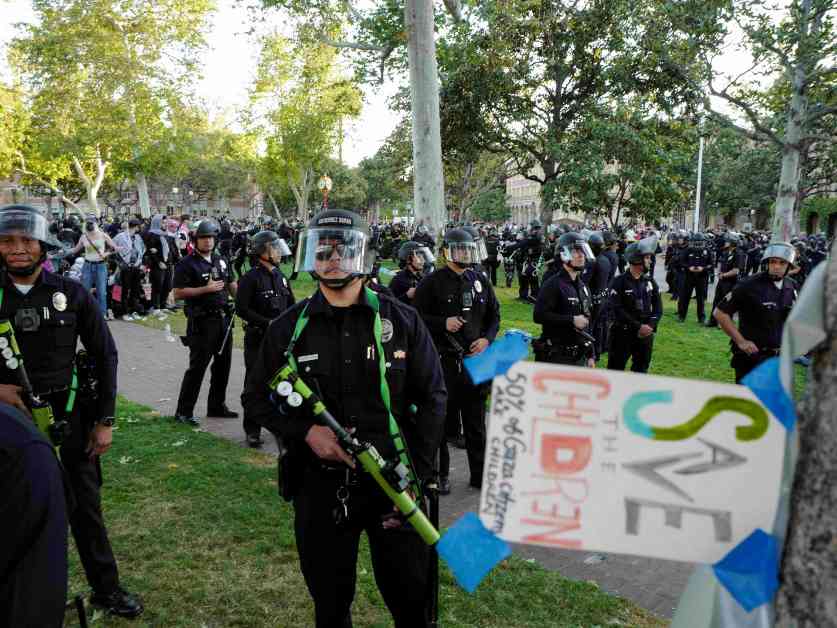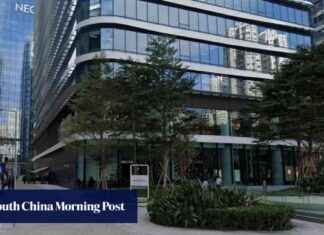The University of Southern California (USC) has been navigating a tumultuous period of protests, arrests, and increased security measures. Last spring, tensions flared as 93 protesters were arrested on campus, leading to questions about the university’s response and commitment to student safety and free expression. USC President Carol Folt found herself facing criticism for calling in a heavily armed Los Angeles police force to disband peaceful student protests and dismantle their encampment.
In the aftermath of the protests, USC implemented stricter security measures, including increased campus patrols by security personnel and off-duty police officers trained in crowd management operations. This fall, new students were greeted with metal bars, security checkpoints, bag checks, and mandatory ID scans. The university also intensified pressure on students and faculty facing sanctions, requiring them to write “reflection papers” expressing remorse and a commitment to making different decisions in the future.
Despite President Folt’s initial statements about de-escalating the situation, USC’s actions have demonstrated a move towards increased repression rather than reconciliation. The campus has effectively been placed on lockdown, with security prioritized above all else. The administration has justified these measures as necessary for maintaining security on campus, but many students and faculty feel the impact of the heightened surveillance and restrictions on their daily lives.
The crackdown on protests and dissent is not unique to USC, as many universities nationwide have faced similar challenges in managing demonstrations and conflicting narratives. Some institutions have chosen to engage with protesters and address their concerns, while others have opted for punitive measures such as suspensions, bans on tents, and heightened security protocols. This trend towards restricting free expression on college campuses has been documented in a recent survey, with USC ranking low in terms of protecting free speech rights.
The securitization of USC’s campus has raised concerns not only among students and faculty but also within the surrounding community of South LA. The heightened security measures have created barriers to access, leading to a sense of exclusion and surveillance that is particularly impactful on marginalized groups, including students of color. The university’s response to protests and dissent has further strained relations with the community and highlighted the disconnect between USC’s values of openness and inquiry and its security-driven approach.
As USC continues to prioritize security over free expression, questions arise about the role of university leaders in upholding these values. President Folt and other college presidents are urged to reconsider their approach and prioritize dialogue, understanding, and inclusivity. The current trajectory of repressive measures risks further alienating students and faculty and undermining the fundamental principles of academic freedom and open discourse.
In the face of growing concerns about the militarization of campus security and the erosion of free expression, it is essential for universities to reevaluate their approach to protests and dissent. USC’s experience serves as a cautionary tale of the dangers of prioritizing security over academic freedom and community engagement. It is not too late for President Folt and other university leaders to course correct and reaffirm their commitment to fostering a campus environment that values diversity, dialogue, and dissent.
Challenges of Managing Protests
The events at USC highlight the challenges that universities face in managing protests and dissent on campus. The tensions between upholding security and protecting free expression can create a delicate balancing act for university administrators. The crackdown on protests and the implementation of stringent security measures raise questions about the impact on students, faculty, and the broader community.
Impact on Campus Culture
The shift towards a more securitized campus environment at USC has had a profound impact on the university’s culture and sense of community. The restrictions on protests, the surveillance measures, and the increased security presence have created a climate of fear and mistrust among students and faculty. The erosion of academic freedom and open dialogue threatens to undermine the core values of the university and stifle intellectual inquiry.
Call for Reevaluation and Reform
In light of the challenges and concerns raised by the events at USC, there is a pressing need for university leaders to reevaluate their approach to managing protests and dissent. President Folt and other college presidents should prioritize dialogue, engagement, and inclusivity to address the underlying issues that have led to the current climate of repression and surveillance. By fostering a culture of openness and respect for diverse perspectives, universities can create a more vibrant and inclusive campus environment for all members of the community.
The views expressed in this article are the author’s own and do not necessarily reflect Al Jazeera’s editorial stance.



























